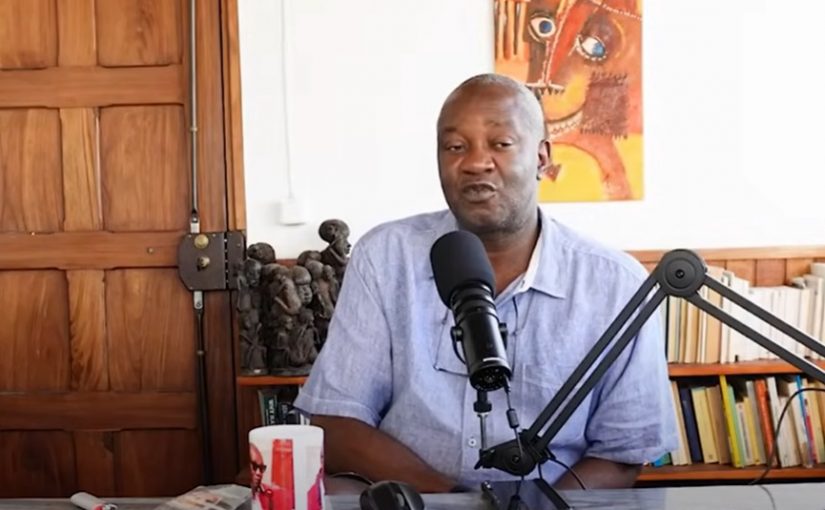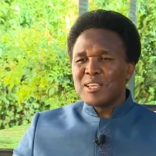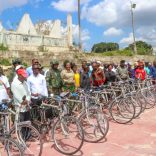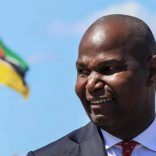Mozambique: Mondlane says has information that he will be arrested upon his return from Europe - ...
Mozambique Elections: Political manifestos “are very poor” – Ngoenha

FILE - For illustration purposes only. [File photo: Screen Grab YouTube]
Mozambican political scientist Severino Ngoenha says that the manifestos presented by Mozambique’s political parties for the October general elections are poor and lack “internal democracy”, and that a project more based on the concrete reality of the country is necessary.
“The manifestos are very poor. […] Our democracy and our elections lack a fundamental element: a political project that is based on the concrete reality of the country,” Severino Ngoenha said in an interview with Lusa in Maputo.
For the author of “From Independence to Freedoms”, the manifestos presented by the main political parties in Mozambique do not present a “project for society”, noting that the manifesto of the Front for the Liberation of Mozambique (Frelimo), the party in power, repeats many elements of previous promises that remain unfulfilled, and that the opposition is “weak”.
“When we look at the [Frelimo] manifesto, we see that it largely repeats what the current President stated and failed to achieve. […] The other parties are very weak in terms of projects. I don’t see a major project in Renamo [the main opposition force], I don’t see one in the Democratic Movement of Mozambique [the third parliamentary force] and Venâncio Mondlane, with his Democratic Alliance Coalition, seems to bring some political breathing space, but it is utopian, in the sense of thinking that he can achieve impossible things,” Ngoenha declares.
Among the main weaknesses of democracy in Mozambique, he continued, is the lack of balance in parliament, which has historically been dominated by the Frelimo since 1975.
“Our parliament has ceased to debate ideas. What Renamo and the MDM propose is never accepted and what Frelimo proposes is never challenged, because the party in power does not listen to others,” notes Ngoenha, pointing as a counter-example to the South African elections, where the African National Congress lost its absolute majority in parliament for the first time in 30 years of government.
“Everyone saw this as a defeat for the ANC, but it was not. It was a victory for democracy because, first, political decisions, economic, social and life decisions in the country will have to be negotiated. This is part of democracy, and one of the weaknesses of Mozambican democracy is the fact that whoever wins has everything and whoever has everything governs,” he added.
According to the author of “The Return of the Noble Savage”, the current parliament, whose members are elected from party lists, does not represent the people and, consequently, is not debating the concerns of a “homogeneous and heterogeneous” Mozambique.
“What parliaments do in the world is make laws and monitor the government’s actions. Our parliament not only does not propose laws – 99% of the laws we have come from the executive. Secondly, there is no monitoring of the government’s actions. There is enormous complicity in parliament, because it is led by the Frelimo parliamentary group. What the government does is what Frelimo decides,” Ngoenha declares, highlighting that the country needs to free the legislative and judicial branches from the “shackles” imposed by the executive.
The lack of internal democracy in the parties is among the main obstacles to the country’s political growth, noted the author of “Por uma Dimensão Moçambicana da Consciência Histórica”.
“You saw what happened in the elections for the presidency of Renamo, in which Venâncio Mondlane was not even allowed to enter the congress. You look at what happens in the MDM, where the same people always prevail in the top positions and you saw how Daniel Chapo was elected. The people did not want Roque Silva [former secretary-general of Frelimo, who was among the candidates] and the one who came out, in the totobola of the lists, was Chapo”, he stated.
Ngoenha says that the weaknesses of the electoral bodies in Mozambique continue to condition the popular will and that the country continues to spend money on a process that always has “fabricated results”.
“Even in these elections, which would be the only time when people could express their will and punish those who have misled the country, while rewarding those who seem to offer hope, what we see is that there is no transparency. […] No one believes that the results of the elections are what the popular plebiscite was. All we can say is that we have a false democracy,” he observed.
Mozambique will elect a new head of state on 9 October this year, as part of the seventh presidential elections, taking place simultaneously with the legislative elections and elections for provincial governors and assemblies.













Leave a Reply
Be the First to Comment!
You must be logged in to post a comment.
You must be logged in to post a comment.